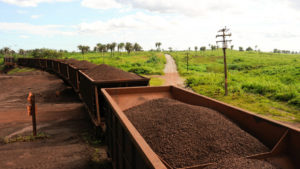Chinese contractors still interested in this battered and bruised iron ore play

Sundance Resources has suffered a number of punches, but the iron ore play is not giving up in its search for an investor in its Cameroon project. Picture: Getty
Troubled iron ore play Sundance Resources has reported strong interest from un-named Chinese contractors to build its $1 billion Mbalam-Nabeba iron ore development in Cameroon.
But the news has failed to lift the spirits of long-suffering investors.
Since last month’s news of a six-month extension from Cameroon government to progress the project, Perth-based Sundance (ASX:SDL) says it has received increased interest from infrastructure engineering, procurement and construction (EPC) contractors looking to build and help secure funding for the project.
“In the coming weeks, the CEO of Sundance will return to China for further discussions with a number of EPC contractors who have expressed their recent desire to be involved in the project. This includes private Chinese companies and Chinese State-owned enterprises,” Sundance said.
However, Sundance hasn’t previously had much luck with the Chinese.
Early last year, China Gezhouba Group pulled out of a deal to build the Mbalam-Nabeba project’s key port and rail infrastructure, preferring to wait until mining conditions had improved.
Last month, Sundance reached agreement with the Cameroon government on a six-month extension to the Mbalam Convention to progress the iron ore project. The Mbalam convention was signed by Sundance and Cameroon government back in 2012 and paved the way for the development of the project.
The government also warned any further extensions to the convention would only take place if Sundance showed progress on funding the project either by itself or with a creditable partner.
Sundance has meanwhile conserving cash by cutting jobs and pay for board members.
The company began the September quarter with about $794,000 cash, with an expected spend of $525,000 during the current quarter.
Sundance is looking to boost the kitty with a $1 million share purchase plan underwritten by Patersons Securities.
Meanwhile customs officials in Cameroon have found discrepancies in paper work provided by third parties to Sundance subsidiary Cam Iron concerning the sale of vehicles and related customs records.
“There is no indication at this time that Cam Iron should have been aware of the discrepancies. The impact of these discrepancies on Cam Iron is uncertain and this matter is the subject of further investigation by Cam Iron,” Sundance reported.
Production from Mbalam-Nabeba project, which straddles the border of Cameroon and the Republic of Congo in Central Africa, comprises of two stages.
Stage one will see the production of a sinter fines (iron ore powder) averaging more than 62 per cent iron at a rate of 40 million tonnes per year for around 14 years.
Stage Two, which is now at a pre-feasibility stage, would extend the life of the operation by another 15 years producing high-grade Itabirite hematite concentrate.
Rail and port infrastructure for the project will be financed, built and owned by the Government of Cameroon. It will include a 540km rail line to transport iron ore through Cameroon and a mineral export terminal to take bulk iron ore carriers of up to 300,000 tonnes.
Shares in Sundance remain unchanged at 0.4c today valuing the company at around $21 million.
UNLOCK INSIGHTS
Discover the untold stories of emerging ASX stocks.
Daily news and expert analysis, it's free to subscribe.
By proceeding, you confirm you understand that we handle personal information in accordance with our Privacy Policy.








